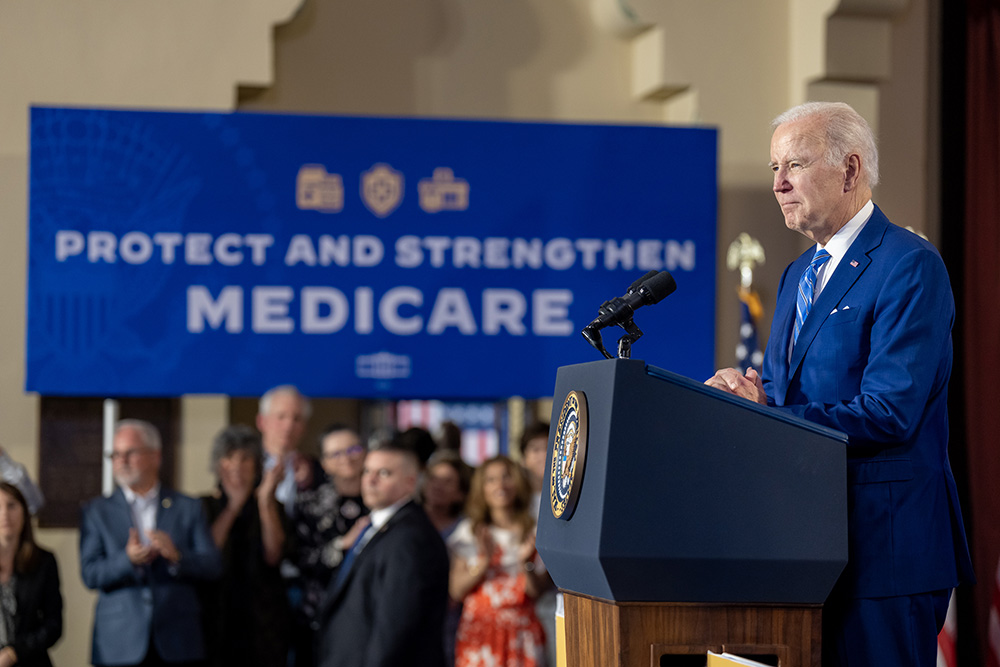
President Joe Biden delivers remarks on Social Security and Medicare Feb. 9 at the University of Tampa in Florida. (Official White House Photo/Adam Schultz)
The Biden administration has announced the first 10 drugs for which Medicare and Medicaid will be permitted to negotiate the price. This marks the first step toward ending one of the most illogical policy restrictions ever placed on a government by itself.
In 2003, under pressure to do something about the rising cost of prescription drugs, Congress created Medicare Part D. In order to gain Republican support for the new, very expensive program, the law prohibited Medicare and Medicaid from negotiating with the drug manufacturers over the cost of their drugs, even though the two government programs were the biggest customers in the market. Americans were paying more money for the same drugs than people in other countries, even if the drugs were manufactured here in the U.S.
The ban on negotiating prices is only a sliver of what is insane about our health care system. A friend of mine in France was telling me that when she recently went to the doctor, the insurance even covered the cost of the cab to the doctor's office! Yet, here in America, we still have 27.6 million people without health insurance in this, the wealthiest country in the history of the world, and the insurance companies nickel-and-dime if you do have coverage.
Catholic social teaching is clear in this regard: Human dignity demands that every person have access to affordable health care.
Health care in this country also has a distinctive place in the history and ecclesiology of the Catholic faith. As Pope John Paul II said to Catholic health care workers in Phoenix in 1987:
This meeting gives us the opportunity to honor and give thanks to God for one of the most extensive and fundamental works of the Catholic Church in the United States, all that is embraced in the term "Catholic health care." I am pleased to be able to express to you who represent so many of your country's health care organizations the esteem, support and solidarity of the whole church. In you, Jesus Christ continues his healing ministry, "curing the people of every disease and illness."
So, there is something fitting in the fact that it is the nation's second Catholic president who has taken this step that will shore up the finances of Medicare and Medicaid, guaranteeing the access they provide to millions of Americans.
President Joe Biden acknowledged how long he and fellow Democrats had been fighting to achieve this.
Advertisement
"For years, Big Pharma blocked this. They kept prescription drug prices high to increase their profits. They extended patents on existing drugs to suppress fair competition instead of innovating, playing games with pricing so they could charge whatever they can," Biden told supporters at an event in the East Room of the White House. "But this is — finally, finally, finally, we had enough votes, by a matter of one, to beat Big Pharma. Well, we did it."
Biden also put the issue in a broader context than the partisan fight inside the Beltway that was needed to pass the legislation. "On too many nights, too many Americans lay in bed staring at the ceiling, worrying what will happen if their spouse gets sick, if their child gets sick, or if something else happens to them," the president said.
Permitting negotiations over drug prices, even for just these 10 medicines, is expected to save the government $100 billion over the next decade.
The next time someone warns that Medicare or Social Security is going bankrupt, ask them where they stand on allowing the government to negotiate drug prices. It seems, the same people warning about the need to curtail benefits for seniors are the people who fought allowing the government to negotiate with the drug companies. GOP messaging on this sounds like it was written by the communication departments at the drug companies themselves.
This issue should be a big winner for the Dems. The problem is the timeline.
The public and the drug companies have until Oct. 2 to make comments and then the Centers for Medicare & Medicaid Services will hold listening sessions between Oct. 30 and Nov. 15. On Feb. 1, 2024, the centers will make a price offer and the pharmaceutical companies have 30 days to respond. There can be three rounds of negotiations, ending on Aug. 1, 2024. The new process takes effect on Jan. 1, 2026.
Whoever came up with that timeline is a policy wonk, not a politician. Jan. 1, 2026, will be almost one year after the inauguration of the president elected in 2024. The happy effects of finally forcing Big Pharma into negotiations over drug prices will not be felt in time for next year's election.
The provision permitting the Centers for Medicare & Medicaid Services to negotiate over drug prices was part of the Inflation Reduction Act, which, along with the Infrastructure Investment and Jobs Act, are the cornerstones of Bidenomics, the long-overdue progressive rebuttal to 40 years of neoliberalism.
As the Roosevelt Institute states, "The through line of Bidenomics is that power and resources have become much too concentrated in the hands of economic elites, at the expense of the working and middle class." Bidenomics is perfectly consistent with Catholic social teaching about the right ordering of economic relations.
I just hope the voters get the message before November 2024.





